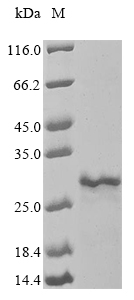The production of the recombinant Mycobacterium smegmatis porin MspA begins with the creation of the recombinant plasmid, which is synthesized by co-inserting the gene encoding the Mycobacterium smegmatis MspA protein (28-211aa) with the N-terminal 10xHis-tag gene into a plasmid vector. The recombinant plasmid is introduced into E.coli cells. E.coli cells that can survive in the presence of a specific antibiotic are selected and then cultured under conditions conducive to the expression of the gene of interest. Following expression, the recombinant MspA protein is isolated and purified from the cell lysate using affinity purification. Denaturing SDS-PAGE is then employed to resolve the resulting recombinant Mycobacterium smegmatis MspA protein, demonstrating a purity exceeding 85%.
The protein MspA, found in Mycobacterium smegmatis, is a key player in moving charged particles across the cell membrane [1]. Unlike other outer membrane proteins, MspA stands out structurally and serves as the primary route for water-soluble molecules to enter Mycobacterium smegmatis [2]. Acting as the main doorway, MspA allows small, water-loving molecules to pass through the tough outer membrane [3]. Remarkably, even under harsh conditions like boiling or exposure to strong solvents, MspA maintains its structure, highlighting its stability [4]. Moreover, MspA is crucial for creating paths through the cell wall of Mycobacterium smegmatis [5].
MspA, forming eight parts with a single opening, is perfect for nanopore sequencing [6]. It's also the prototype of a new group of pore-forming proteins that have a single, large pore, enabling the movement of water-soluble molecules through the cell wall [7]. The gene responsible for MspA makes a precursor protein, which then gets processed into the mature form [8][9].
References:
[1] A. Perera, H. Wang, M. Basel, M. Pokhrel, P. Gamage, M. Kalitaet al., Channel blocking of mspa revisited, Langmuir, vol. 29, no. 1, p. 308-315, 2012. https://doi.org/10.1021/la3037296
[2] M. Pavlenok, The c‐terminus is essential for the stability of the mycobacterial channel protein mspa, Protein Science, vol. 33, no. 3, 2024. https://doi.org/10.1002/pro.4912
[3] D. Hillmann, I. Eschenbacher, A. Thiel, & M. Niederweis, Expression of the major porin gene mspa is regulated in mycobacterium smegmatis, Journal of Bacteriology, vol. 189, no. 3, p. 958-967, 2007. https://doi.org/10.1128/jb.01474-06
[4] S. Bossmann, K. Janik, M. Pokhrel, C. Heinz, & M. Niederweis, Reconstitution of a porin from mycobacterium smegmatis at hopg covered with hydrophobic host layers, Surface and Interface Analysis, vol. 36, no. 2, p. 127-134, 2004. https://doi.org/10.1002/sia.1671
[5] C. Stahl, S. Kubetzko, I. Kaps, S. Seeber, H. Engelhardt, & M. Niederweis, Mspa provides the main hydrophilic pathway through the cell wall of mycobacterium smegmatis, Molecular Microbiology, vol. 40, no. 2, p. 451-464, 2001. https://doi.org/10.1046/j.1365-2958.2001.02394.x
[6] I. Derrington, T. Butler, M. Collins, E. Manrao, M. Pavlenok, M. Niederweiset al., Nanopore dna sequencing with mspa, Proceedings of the National Academy of Sciences, vol. 107, no. 37, p. 16060-16065, 2010. https://doi.org/10.1073/pnas.1001831107
[7] C. Heinz, H. Engelhardt, & M. Niederweis, The core of the tetrameric mycobacterial porin mspa is an extremely stable β-sheet domain, Journal of Biological Chemistry, vol. 278, no. 10, p. 8678-8685, 2003. https://doi.org/10.1074/jbc.m212280200
[8] K. Heuner, B. Choi, R. Schade, A. Moter, A. Otto, & U. Göbel, Cloning and characterization of a gene (mspa) encoding the major sheath protein of treponema maltophilum atcc 51939t, Journal of Bacteriology, vol. 181, no. 3, p. 1025-1029, 1999. https://doi.org/10.1128/jb.181.3.1025-1029.1999
[9] M. Niederweis, S. Ehrt, C. Heinz, U. Klöcker, S. Karosi, K. Swidereket al., Cloning of the mspa gene encoding a porin from mycobacterium smegmatis, Molecular Microbiology, vol. 33, no. 5, p. 933-945, 1999. https://doi.org/10.1046/j.1365-2958.1999.01472.x"






